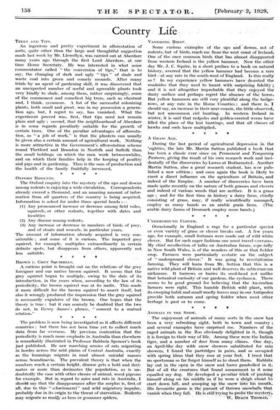Occasionally in England a rage for a particular species or
even variety of grass or clover breaks out. A few years ago, for example, small fortunes were made out of wild white clover. But for such eager fashions one must travel overseas. My chief recollection of talks on Australian farms, espeAally in New South Wales, is of the wonders of this or that fodder crop. Farmers were particularly ecstatic on the subject of " underground clover." It was going to revolutionize farming. They will learn from Mr. Sutton that this is a native wild plant of Britain and well deserves its subterranean nickname. It burrows or buries its seed-head not unlike that botanical curiosity of our gardens, the cyclamen. There seems to be good ground for believing that the Australian farmers were right. This humble British wild plant, with its creeping habit and small woolly leaves may in our Antipodes provide both autumn and spring fodder when most other herbage is past or to come.








































 Previous page
Previous page